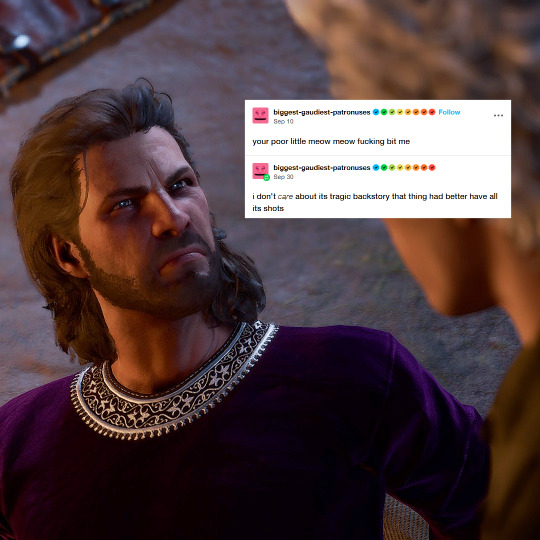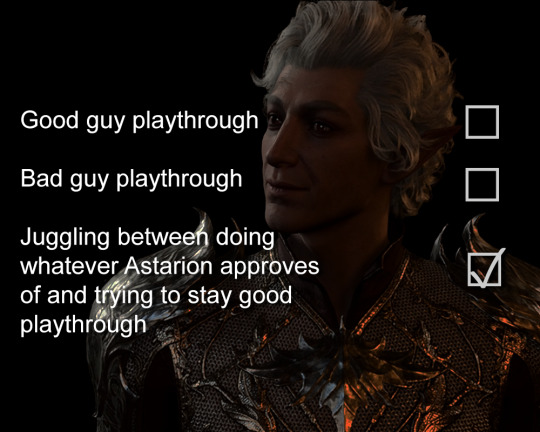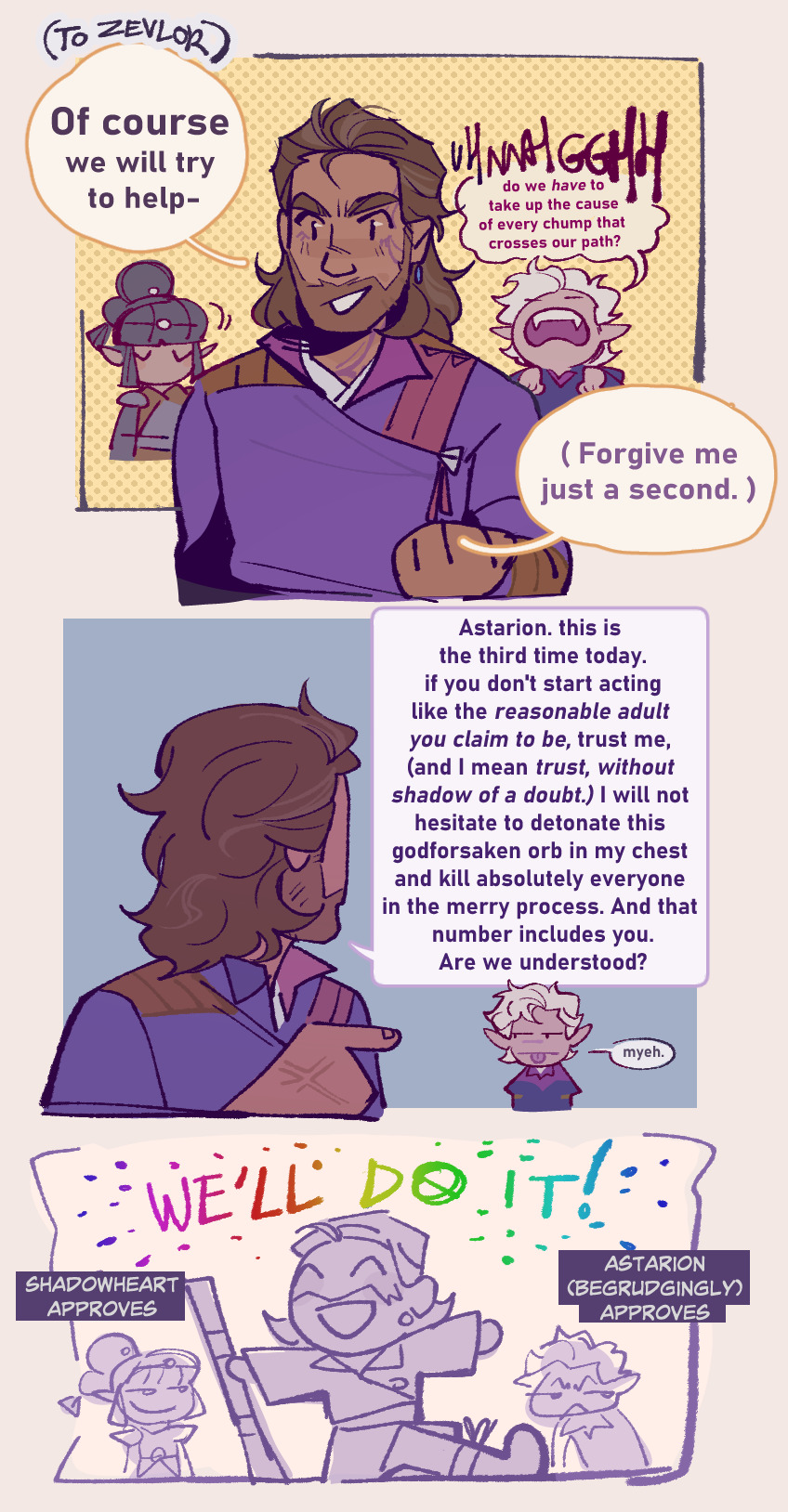Call me Aich or Essay. I don't care what pronouns you use for me. I avoid stan and anti culture in equal measure and if you want to discuss something then please don't come aiming to argue. I track the #essayofthoughts tag
Don't wanna be here? Send us removal request.
Text
do publishers realize that advertising books using fanfic tropes spoils the experience of reading an original story. stop telling me it’s enemies to lovers and there was only one bed and unrequited love hurt comfort golden retriever black cat timeloop major character death. why do i give a fuck if i don’t know any of the characters and now plus i already know the entire plot of the story. that’s what ao3 is supposed to be for
15K notes
·
View notes
Text
looks like the government is doing something about cults
40K notes
·
View notes
Photo









Malachite Carved Skulls via Skullis
707 notes
·
View notes
Text


for either way you choose you cannot win
#astarion bg3#bg3 art#bg3#babiest boy. disaster man. i want to shake him and also i want to help him gut cazador#perfect no notes#queue
64K notes
·
View notes
Text
There is literally no circumstance where I support age verification to access a website. As I've said before I'm very much the "there's nuance here" person on almost everything but on this issue there's no nuance for me, it's awful and horrible in and of itself and it also sets an awful and horrible precedent
#As a teen I absolutely clicked those tickboxes when probably i shouldn't#but the person to blame for that IS ME#for choosing to do that#teens have agency and taking that away from them#denying them that#is so shitty#and is going to deeply DEEPLY fuck them up as adults#and lead to the kinds of adults who refuse to claim agency over anything they do#and instead deflect with “but im just a smol bean!”#rather than admitting they've done anything wrong or fucked up ever#purity culture#fandom things
20K notes
·
View notes
Text
The 2025 Gender Census is now open!
[ Link to survey ]
The 12th annual international gender census, collecting information about the language we use to refer to ourselves and each other, is now open until 30th August 2025.
It’s short and easy, for most participants it takes 5 minutes or less.

After the survey is closed I’ll process the results and publish a spreadsheet of the data and a report summarising the main findings. Then anyone can use them for academic or business purposes, self-advocacy, tracking the popularity of language over time, and just feeling like we’re part of a huge and diverse community.
If you think you might have friends and followers who’d be interested, please do reblog this blog post, and share the survey URL by email or at AFK social groups or on other social networks. Every share is extremely helpful!
Survey URL: https://survey.gendercensus.com
The survey is open to anyone anywhere who speaks English and feels that the gender binary doesn’t fully describe their experience of themselves and their gender(s) or lack thereof.
If you can't wait for survey numbers, you can click here for a public spreadsheet of non-secret info with graphs as it comes in, updated manually a few times per day.
Thank you so much!
[ Link to survey ]
12K notes
·
View notes
Text
the only censorship we need is the block, mute and filter option because giving others the power to dictate what can and cannot exist in fandom will eventually lead to banning all nsfw works or even slightly but nuanced ‘problematic’ topics. I block and move on because I don’t want to see certain things but to erase them completely is a dangerous slope to having things you like be banned eventually.
#truly#people need to remember the kinktomato#Your Kink Is Not My Kink And That's Okay#to curate their own experiences to hit the back button#fandom things#purity culture
9K notes
·
View notes
Text


3K notes
·
View notes
Text

Please, do not mourn for me. This was all my fault—and this is how I fix it.
After penning a message to his loved ones, Gale had set off from Waterdeep to get as far away as he could. He was going to end his life to put an end to the Netherese orb once and for all. Of course, then his carefully laid plan was thwarted when he was abducted by mindflayers and whisked into an adventure.
3K notes
·
View notes
Text

I surely can't be the only one in this
46K notes
·
View notes
Text










New behind the scene look and stills of Guillermo del Toro’s Frankenstein.
Guillermo del Toro’s Frankenstein will stream on Netflix in November 2025
2K notes
·
View notes
Text
baldur's gate 3 is just. break the abuse and trauma cycle. being forced to believe a certain way is wrong. there is more outside of the small window that i perceived the world to be. i will create my own identity. maybe the people i thought loved me did not, in fact, have my best interests at heart. i need to find the clown's body parts so the drag queen can resurrect him. my destiny is not written in stone.
#bg3#yupppp#the characters have all been shattered into sparkly geode shards already!#we get to put them back together! and we get the chance to do it WRONG and hurt them worse#queue
18K notes
·
View notes
Text
I love how bad Astarion is with his cover story. You meet him and he's like "I'm a magistrate" then he stealths, disarms a trap, double dashes and backstabs a goblin all while giggling about spilling blood and you're just like hm yeah that's the legal system for you
19K notes
·
View notes
Text
some rhythm on your blood
chapter thirteen! wherein astarion asks the genuine question of whether something can be called chekhov when it's been the central focus of the past four chapters
7 notes
·
View notes
Text



Gale origin playthru act 1 doodles + tara best girl
#gale bg3#astarion bg3#bg3#bg3 art#honestly the number of times i wanted to shake astarion early on#MY BOY THE FACT I SHOW YOU DECENCY#IS BECAUSE I TRY TO BE DECENT#BEING RANDOMLY CRUEL ALSO INCREASES THE LIKELIHOOD OF THAT CRUELTY TURNING ON YOU#YOU DONT WANT THAT!!#but astarion has such a fucked up history ofc he's like that#queue
23K notes
·
View notes


